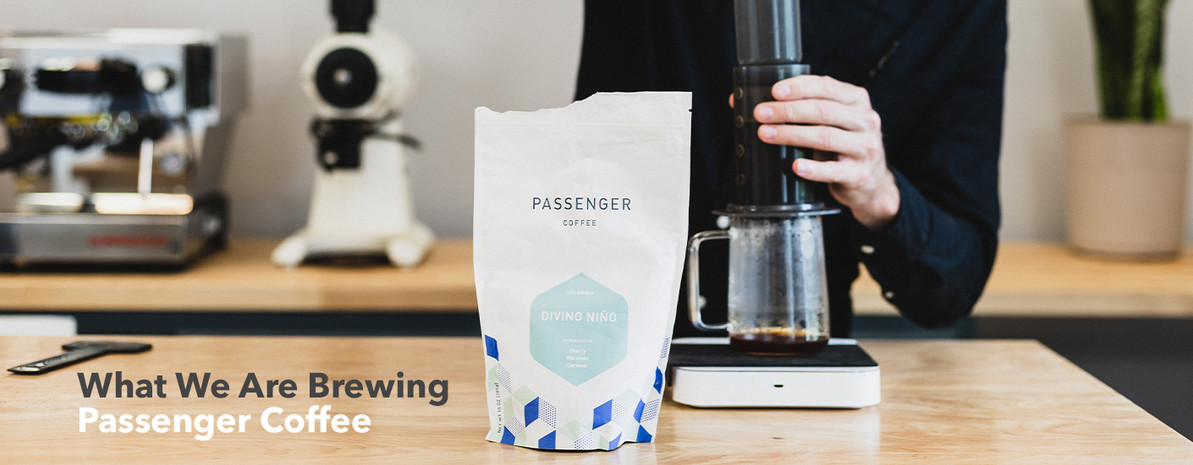What We Are Brewing: Passenger Coffee
The office at Prima is always stocked with coffee. Always. Since we sell coffee equipment, and only that with which we have been able to make consistently tasty cups, we find it necessary to sample coffees from all over the country, at times the world, and, although we prefer lighter roasts, from all over the color spectrum.
With this series, we aim to bring some of that behind-the-scenes experimentation to the fore. We want to give you an opportunity to see, in any given week, what we are brewing and how we are brewing it.
Each month we will highlight a new roaster, a new coffee, and a new recipe as part of a series we’re calling “What We Are Brewing.” The first season will focus on pour over brewers. The third episode features Passenger Coffee.
Located in scenic Lancaster, Pennsylvania, Passenger is a coffee roaster with a unique business model. The main arm of the company is Passenger, which buys specialty-grade coffees and roasts them on the lighter end, preserving their inherent flavors. The sister company, called Necessary, on the other hand, buys non-specialty grade coffees and roasts them a little darker, marrying flavors from origin with those from the roast. Together, the two arms are able to support producers in a big way by buying up whole harvests, allowing farmers to focus on what they do best without having to worry about finding buyers for individual lots, being left with unsold green beans, or worse—unloading coffee at rock-bottom commodity prices.
Sourced with the help of Osito Coffee, Divino Niño, a washed coffee grown by a producer group in the municipality of Suaza in southern Huila, Colombia, is one of Passenger’s “foundational” offerings. As such, this beautiful lot will be available all year; and, as a bonus, coffee from different lots on the same farms will be available from Passenger’s sister company, Necessary, in the bag simply labeled Colombia. Both brands buy and roast only specialty coffee, but they each offer a unique flavor profile. Passenger’s Divino Niño is perfect for those who want a light, fruit-forward coffee; and Necessary’s Colombia is perfect for those who want a rich, full-bodied brew. Everybody wins. Even the producers. And that is the point.
Divino Niño, according to the expert tasters at Passenger, is a lively coffee with aromas of plum, caramel, and marzipan and a deep sweetness reminiscent of cooked fruit and browning sugar. We like that description. Using the AeroPress recipe below, we have discovered a delicious marriage of citrus and cherry juice that we describe around here as refreshing.
| Roaster: | Passenger |
|---|---|
| Coffee: | Divino Niño |
| Variety: | Caturra, Colombia, Castillo |
| Process: | Washed |
| Brewing Device: | AeroPress |
| Grind: | Fine |
| Dose: | 15 grams |
| Water: | 215 grams at 212°F |
| Time: | 2:15 |
Before the brewing begins, all the prep work must be done. Heat the water. Grind the coffee. Place the filter in its holder and screw it onto the AeroPress. Add the ground coffee. Tare the scale. Start the timer.
- Pour all 215g of water. Aim for the wall just to make sure the water isn’t boiling when it hits the coffee. Stir gently, enough to mix the solution. Then place the plunger in the cylinder and pull up slightly to create a vacuum seal.
- At the one-minute mark, open the hatch and give it a gentle stir; then replace the plunger, creating that vacuum seal again.
- At 1:45 seconds, or when the water has mostly, but not completely, drawn down and through the coffee bed, add the remaining 120g of water. Swirl.
At 2:00 minutes, remove the plunger and gently stir for the final time, making sure not to over-agitate the grounds. Then plunge. Don’t press too hard; just lean on the plunger with your weight and let it descend naturally. If the coffee is not as juicy as you would like, grind finer, or go longer, or both. Try an extra stir. Use the inverted method. The beauty of the AeroPress is in its possibilities.



